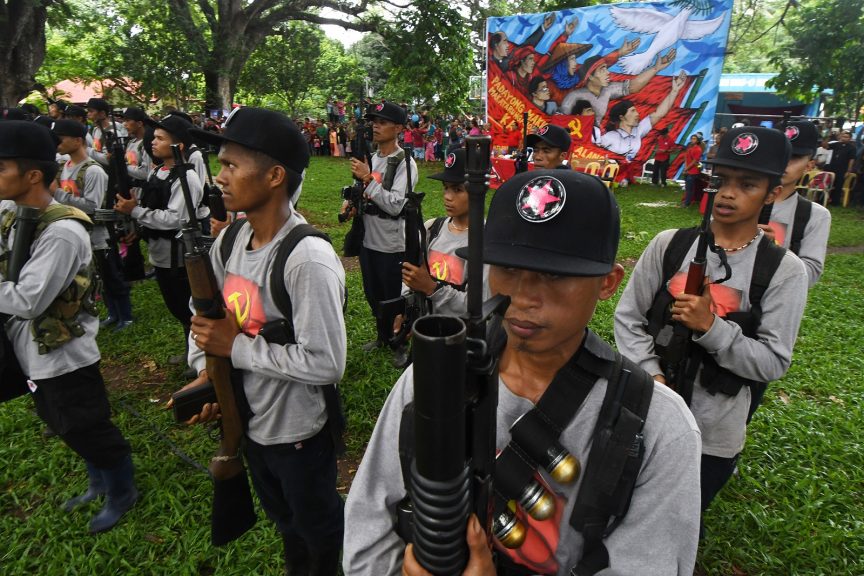 A platoon of NPA guerrillas render a salute during the 48th founding anniversary of the Communist Party of the Philippines in barangay Mananom-Bago, Medina town, Misamis Oriental on Dec. 28, 2016. MindaNews file photo by FROILAN GALLARDO
A platoon of NPA guerrillas render a salute during the 48th founding anniversary of the Communist Party of the Philippines in barangay Mananom-Bago, Medina town, Misamis Oriental on Dec. 28, 2016. MindaNews file photo by FROILAN GALLARDO
CAGAYAN DE ORO CITY (MindaNews / 17 April) — Army soldiers bumped into a huge cache of dynamites, medical and food supplies believed stashed by the New People’s Army (NPA) in Bunawan town, Agusan del Sur last Sunday, a military official said.
Major General Ronald Villanueva, commanding general of the 4th Infantry Division said the 315 pieces of dynamites if properly prepared with fertilizer phosphates, could blow up bridges, maim soldiers and policemen and become a major security risk for Mindanao.
Villanueva said they are investigating how the explosives ended up in the hands of NPA rebels when mining firms using them are supposed to handle them under heavy supervision by law enforcement agencies.
“We are looking where the explosives were pilfered. Was there lack of supervision?” he said.
Capt. Tere Ingente, spokesperson of the 4th Infantry Division said the soldiers found the explosives along with medical and food supplies in the middle of a jungle clearing in a village in Bunawan last Sunday.
Ingente said the soldiers also seized M14 and AK47 assault rifles with 17 assorted magazines, blasting caps, 450 meters of electrical wire, radio sets and power generators.
“The soldiers were surprised to find the super dyne dynamites hidden among the plastic containers for water,” she said.
She said the rebels usually used one stick of the foot-long dynamite for improvised explosive devices targeting soldiers or packed 75 pieces of the explosive to make a big IED for mobile military and police vehicles.
“Both are very deadly for soldiers and policemen. Sometimes civilians are among the casualties,” she said.
The Philippines signed the Landmine Ban Convention on Dec. 3, 1997 and ratified it three years later, on Feb. 15, 2000.
Commonly called the Mine Ban Treaty or Ottawa Convention, the agreement prohibits the use, stockpiling, production and transfer of anti-personnel landmines. The treaty defines anti-personnel landmines as those “designed to be exploded by the presence, proximity or contact of a person and that will incapacitate, injure or kill one or more persons.”
The Armed Forces of the Philippines regularly attributes landmine incidents to the NPA.
In a letter to the Landmine and Cluster Munition Monitor, the Communist Party of the Philippines said its armed wing, the NPA, only uses “command-detonated anti-vehicle mines,” which are not prohibited by the Mine Ban Treaty.
The Monitor is an initiative providing research for the International Campaign to Ban Landmines and the Cluster Munition Coalition.
Supervision appears to be lax among mining companies using dynamites in the Philippines. Police and Army units seized 18,000 pieces of dynamites from an abandoned mining site in Isulan, Sultan Kudarat province in 2016.
Fighting between the government and the NPA rebels has continued despite the order of President Rodrigo Duterte to resume peace talks with the communist rebels. (Froilan Gallardo/MindaNews)
